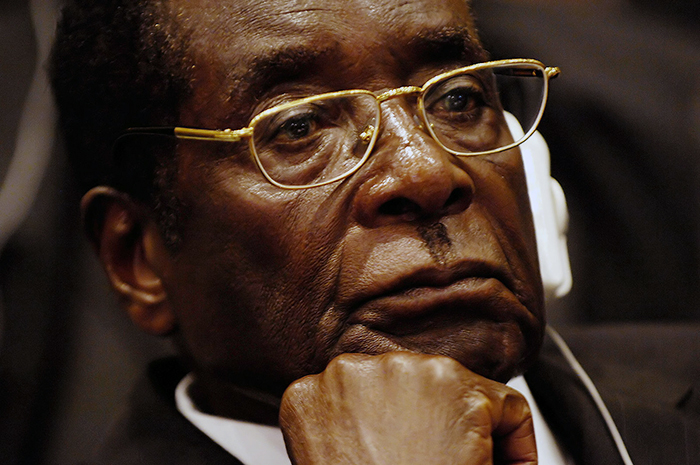
Far from the image of Robert Mugabe as ”the dictator” in almost all recent Western media, Mugabe will remain the greatest hero Africa has ever celebrated as far as concerning the efforts to fight for the well-being of the black community in Zimbabwe. Unfortunately after 37 years of reign as Prime Minister and President, some people celebrates his departure. NewsVoice correspondent in Africa Lilian Neg describes another image of Mugabe in contrast to the Western media outlets.
By Lilian Neg, Africa correspondent for NewsVoice

It is difficult to understand the reactions of the Zimbabweans closely after Mugabe resigns. Obviously people have forgotten to soon the great job he did to valorize the black community under a system which was unfavorable, segregationist and autocratic. Before he took over in 1980, the Zimbabwe government was regardless to blacks.
I try to answer these three questions:
- How can the world remember and celebrate Mugabe as a visionary?
- Where and how did Mugabe go wrong?
- What will be the future of Zimbabwe be without Mugabe?
The story of Robert Mugabe: A militant
Son of a migrant of Nyassaland, Robert Mugabe was born on the 21st February 1924 in Kumata former South of Rhodesia (Zimbabwe). He studied education and was appointed Prime Minister from 1980 to 1987 and President from 1987. He engagement in the fight of the colonial war which started in 1963 when he integrated politics, participated to the foundation of the Zimbabwe African People Union (ZAPU), then later he created his own party called Zimbabwe African National Union (ZANU).
In 1964 due to engagement, Robert Mugabe was arrested with other nationalists and sentenced for 10 years in prison at the restriction camp of Gonakudzingwa near the boundary between Rhodesia and Mozambica, he was not able to attend the burial ceremony of his son while in prison.
Ian Smith
In 1974 when Robert Mugabe was out from jail, all what he had on his mind, was revenge against the colonial system, against the white community. He carried out a guerrilla front and overcome the Government of Ian Smith [ex military], because of his courage, his people called him the father of Independence. Shortly after South Rhodesia became Zimbabwe.
FACTS: Ian Douglas Smith (1919-2007) was a politician and fighter pilot who served as Prime Minister of Rhodesia (Southern Rhodesia; today Zimbabwe) 1964-1979. He led the predominantly white government and remained PM for almost all of the fourteen years while he oversaw Rhodesia’s security forces during the Bush War against the communist-backed black nationalist guerrilla groups. Smith remains a highly controversial figure. Supporters venerate him as a man of integrity and vision ”who understood the uncomfortable truths of Africa”, while critics describe an unrepentant racist whose policies and actions caused the deaths of thousands and contributed to Zimbabwe’s later crises. –Wikipedia
Remember and celebrate Robert Mugabe – A visionary
When Robert Mugabe became president, he had a vision which was mainly to reduce the gap between the white rich minority and the black poor majority. He installed a presidential regime, which permit him to concentrate all the power formally detained by the Prime Minister in order to fulfill his dream.
His engagement to fight the colonial system became visible as he carried out reforms on institutions. The remarkable reforms on land properties made him much popular among his people and in Africa in general.
Mugabe decided to seize lands and properties and redistribute to black people of poor origin, and expel some on their lands, he facilitated the procedure to acquire land titles and permit a large number of unprivileged people to be proprietor.
Robert Mugabe decided to carry loud the voice of Africa world wide, he believed on African values and potentials. He was along side Mohammar Khadafi founding fathers of the African Union.
Due to his leadership skills and the politics he put in place, Mugabe became unpopular among the white community whereas the black majority was privileged. He was later accused of restraining liberty, freedom of speech and much more racism against the white community.
How and why Mugabe went wrong
The reign of Robert Mugabe will have been a genuine one if the people he fought for were conscious of the advantages they experienced. The lack of management skills and entrepreneurship do not facilitate the process engaged by Mugabe because the large majority was incapable of maintaining the economical rate of Zimbabwe.
The productivity sectors dropped, the agro-industrial sector which was detained by white proprietors were ruined, and consequently in 2008 Zimbabwe fell under recession. The good job done by Mugabe become much criticized, notably a huge unemployment, the upper inflation rate and hunger whereas Zimbabwe was the second producer of corn in Africa.
West’s economical revenues declined
Zimbabwe is an agricultural country with a large diversity and resources. Still the country failed to maintain its lead among the countries of the Southern regions of Africa. Due to his tenacity, Mugabe was banned several years ago by European countries which decided to drop partnership with Zimbabwe and the Zimbabwe market was closed to the external world.
Regardless to his damage image, he decided to remain in power as a challenge, he had the support of his army and some influence members of Government along side his vice president Emerson Mnangagwa and more ever his wife Grace Mugabe.
In 2017, the economic situation became critical, Mugabe close collaborators were accused of embezzlement and corruption, the targeted minister of finance Ignatius Chombo, the population had the feelings they were suffering because Mugabe has been in power for too long, and they decided to carry actions against him.
As a response Robert Mugabe decided to sack some key members of the regime among whom his Vice president and the position of Grace Mugabe became more and more controversial, she was merely opposed to decision taken by her husband, Mugabe also received the disapproval of the military top ranking officers.
In November 2017 while he was still at office, the military put him under house arrest. After a week of negotiations and pressure while the parliament was to put a procedure of destitution on his behalf, he announced his departure at the president.
The future of Zimbabwe without Mugabe
The former vice president Emmerson Mnangagwa took over as the constitution of Zimbabwe demands. Immediately after the British foreign secretary announced the revocation of sanctions imposed on Zimbabwe with direct effect and readmitted Zimbabwe into Commonwealth of Nations.
The new interim president took investors around the country, showing them investment opportunities in the mining sector. And all is set to give the world the impression that the presidency of Mugabe was hell on Earth.
One thing is certain, the development of Zimbabwe will be based on productivity and creativity. The fight to stop corruption and embezzlement must be effective. Zimbabweans should not concentrate on race origins (black or white), they need to implement development projects, if not, Zimbabwe without Mugabe will be a disaster.
By Lilian Neg, Africa correspondent for NewsVoice
Related
- San Francisco Chronicle: AP Was There: Mugabe sworn in as Zimbabwe’s prime minister

